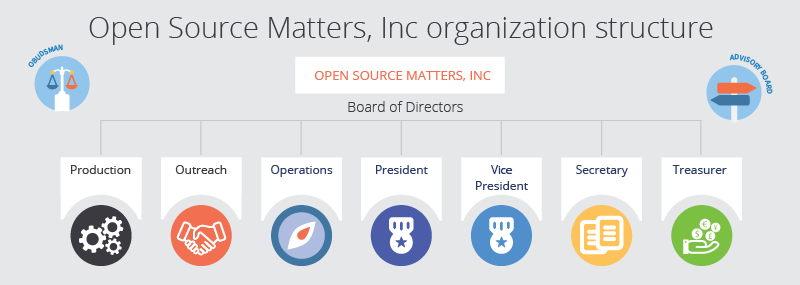1. What is Open Source Matters?
Open Source Matters is the non-profit organisation that provides organisational, legal and financial support for the Joomla! open-source project. It is responsible for all project activities and it represents the teams operating under the departments who make up the organisation.

2. What is the relationship between Open Source Matters and the Joomla! Project?
Open Source Matters is the required legal entity for the Joomla! Project and exists to serve the sole benefit of the project as a whole.
3. Where does Open Source Matters get its money?
The major sources of revenue are:
- advertising on the joomla.org websites
- sponsorships
- royalties on books
- the Joomla! Shop
- the Demo site
- joomla.com
4. What does Open Source Matters spend money on?
The major categories of expenses are:
- Supporting the presence of Joomla! booths and attendance of team members at IT events
- Supporting Joomla! Days and other Joomla! Events
- Team meetings
- Accounting and legal expenses
- Taxes
- Development and other services for the Joomla! Project
- Shop
- Various other expenses involved in operating an open source project or requested by the leadership teams
5. Who decides what the expenditures will be?
The department coordinators liaise with their teams and the budget is approved by the full Open Source Matters board.
7. Who controls Joomla!?
Open Source Matters Inc. controls items such as trademark, finances and other day to day operations. It is our community who is in control of Joomla!, the board serves them in a formal manner.
8. What are the assets of the Joomla! project?
As an open source project, the most valuable part of Joomla! is the Joomla! community of users and contributors. However, in a legal sense, there are trademark and copyright assets that have monetary and other value and that need to be protected in order to protect the project as a whole. In addition, Open Source Matters own the joomla.org and opensourcematters.org domains.
9. Who is on the board of OSM and what are their roles?
The current board consists of a board of directors.
10. How are the directors of the board appointed?
Department Coordinators are elected by the team leaders of each department. Officers are elected by Department and existing Officers. This is acheived through an election process after a call for nominations open to all the Community members.
11. Who oversees the board?
The board will be overseen by an Advisory Board which will include members of other communities..
12. How often does the board meet?
Legally, there must be one annual meeting of the board. However, the board meets in person and virtually as needed to carry out the responsibilities of Open Source Matters. Meetings are generally monthly.
13. Is Open Source Matters a foundation?
Not by United States law. We are a non-profit incorporated in the United States, and are not funded by any single entity.
14. Why is Open Source Matters an incorporated body when it's supposed to be not-for-profit?
In the United States, "incorporation" means you took the time to file some paperwork to be a true, legally recognized (and accountable) entity. The word incorporated or Inc. just means that we are a legally recognized entity in the United States and does not mean that we are a for-profit commercial enterprise.
15. Are donations to Open Source Matters tax deductible?
The tax treatment of money given to Open Source Matters depends on what country the payment is from. In the United States payments are not treated as charitable donations and may not be treateed as such. However, it is possible that supporting the Joomla! Project may be considered a business expense. Please contact Open Source Matters if you are interested in suppporting the Joomla Project.
16. Why isn't there a donation form?
Solicitation of charitable donations on the internet is subject to many legal regulations in different geographic locations. Complying with these regulations is quite expensive, and as an organisation OSM has determined that the costs of complying will be more than the amount of donations received.
17. Why isn't Open Source Matters a 501(c)3?
501(c)3 is a tax status awarded by the Internal Revenue Service in the United States. organisations with 501(c)3 status get certain kinds of favorable tax treatment, but they also have to follow certain very stringent rules about revenue sources. 501(c)3 organisations may not derive most of their income from "unrelated business" sources such as advertising. Since the majority of income for Open Source Matters comes from advertising on the joomla.org family of websites OSM would not meet the normal standards for being designated of a 501(c)3. After looking into the costs of various options, it was determined that OSM would pay less in taxes and have lower legal expenses if it did not seek 501(c)3 status.
18. Who does the work for Open Source Matters?
Just as elsewhere in the Joomla! Project there are teams of volunteers that do the work. In some instances they work with paid outside professionals such as lawyers and accountants.
